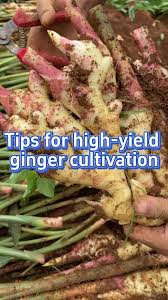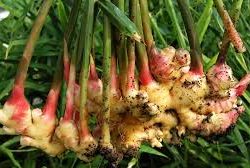TIPS FOR HIGH YIELD IN GINGER CULTIVATION

GINGER IS A HIGH VALUE CROP.
A bag of fresh ginger sells for #600,000. A bag of split dried ginger sells for up to #1,500,000.
Here are tips for successful ginger farming in Nigeria.
# Climate and Soil
1. *Choose the right climate*: Ginger thrives in warm, humid climates with average temperatures between 20-30°C (68-86°F).
2. *Select suitable soil*: Ginger prefers well-draining, rich soil with a pH between 6.0-7.0.
# Planting
1. *Obtain healthy rhizomes*: Buy disease-free ginger rhizomes from a reputable supplier.
2. *Plant at the right time*: In Nigeria, plant ginger in early spring or late summer/early fall, when the weather is cooler.
3. *Plant correctly*: Plant rhizomes 2-3 inches deep, with the “eyes” (small buds) facing upwards.
# Farm Management

1. *Provide adequate water*: Keep the soil consistently moist, but not waterlogged.
2. *Mulch around plants*: Mulch retains moisture, suppresses weeds, and regulates soil temperature.
3. *Control weeds*: Regularly remove weeds to prevent competition for nutrients.
4. *Fertilize*: Apply organic fertilizers, like compost or manure, to promote healthy growth.
# Pest and Disease Management
1. *Monitor for pests*: Regularly inspect plants for signs of pests, like aphids, whiteflies, or spider mites.
2. *Control diseases*: Inspect plants for disease symptoms, like yellowing leaves or black spots. Use organic or chemical controls as needed.
# Harvesting
1. *Wait for maturity*: Ginger is ready to harvest when the leaves start to yellow and die back (around 8-10 months after planting).
2. *Harvest carefully*: Dig carefully around the plants to avoid damaging the rhizomes.
# Additional Tips
1. *Consider intercropping*: Plant ginger with other crops, like turmeric or chili peppers, to promote biodiversity and reduce pests and diseases.
2. *Keep records*: Maintain accurate records of planting, harvesting, and yields to improve future farming decisions.
By following these tips, you’ll be well on your way to growing a successful and profitable ginger crop in Nigeria!


